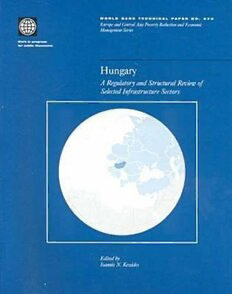Download Hungary: A Regulatory and Structural Review of Selected Infrastructure Sectors (World Bank Technical Paper) PDF Free - Full Version
Download Hungary: A Regulatory and Structural Review of Selected Infrastructure Sectors (World Bank Technical Paper) by Ioannis Nicolaos Kessides in PDF format completely FREE. No registration required, no payment needed. Get instant access to this valuable resource on PDFdrive.to!
About Hungary: A Regulatory and Structural Review of Selected Infrastructure Sectors (World Bank Technical Paper)
Hungary was one of the first countries in Central and Eastern Europe to embark on economic transition. It has also led the region in terms of the restructuring and privatization of the infrastructure sectors—electricity, gas, and telecommunications. In fact, when negotiations over accession into the EU commenced, Hungary's institutional and structural framework was comparable to, if not ahead of, that of most EU countries. However, even an excellent process of reform provides some opportunities for further improvements, especially as new information and experience accumulate. This report: • Provides a diagnostic assessment of recent and ongoing structural and regulatory reforms in Hungary's infrastructure sectors-electricity, oil and gas, and telecommunications; • Identifies priorities for additional competitive restructuring and regulatory decontrol measures, their expected impacts, and policies designed to minimize the transition costs of deregulation and market liberalization; • Assesses the progress made toward compliance with the European Union (EU) accession requirements and identify areas that might benefit from special attention to accelerate the transition to a liberalized regime; • Identifies the major regulatory issues that need to be addressed in the medium term by the Hungarian regulatory agencies and suggest a strategy for addressing these issues. This volume will be of interest to Bank staff, policymakers, and World Bank client countries.
Detailed Information
| Author: | Ioannis Nicolaos Kessides |
|---|---|
| Publication Year: | 2000 |
| ISBN: | 9780585377285 |
| Language: | English |
| File Size: | 0.344 |
| Format: | |
| Price: | FREE |
Safe & Secure Download - No registration required
Why Choose PDFdrive for Your Free Hungary: A Regulatory and Structural Review of Selected Infrastructure Sectors (World Bank Technical Paper) Download?
- 100% Free: No hidden fees or subscriptions required for one book every day.
- No Registration: Immediate access is available without creating accounts for one book every day.
- Safe and Secure: Clean downloads without malware or viruses
- Multiple Formats: PDF, MOBI, Mpub,... optimized for all devices
- Educational Resource: Supporting knowledge sharing and learning
Frequently Asked Questions
Is it really free to download Hungary: A Regulatory and Structural Review of Selected Infrastructure Sectors (World Bank Technical Paper) PDF?
Yes, on https://PDFdrive.to you can download Hungary: A Regulatory and Structural Review of Selected Infrastructure Sectors (World Bank Technical Paper) by Ioannis Nicolaos Kessides completely free. We don't require any payment, subscription, or registration to access this PDF file. For 3 books every day.
How can I read Hungary: A Regulatory and Structural Review of Selected Infrastructure Sectors (World Bank Technical Paper) on my mobile device?
After downloading Hungary: A Regulatory and Structural Review of Selected Infrastructure Sectors (World Bank Technical Paper) PDF, you can open it with any PDF reader app on your phone or tablet. We recommend using Adobe Acrobat Reader, Apple Books, or Google Play Books for the best reading experience.
Is this the full version of Hungary: A Regulatory and Structural Review of Selected Infrastructure Sectors (World Bank Technical Paper)?
Yes, this is the complete PDF version of Hungary: A Regulatory and Structural Review of Selected Infrastructure Sectors (World Bank Technical Paper) by Ioannis Nicolaos Kessides. You will be able to read the entire content as in the printed version without missing any pages.
Is it legal to download Hungary: A Regulatory and Structural Review of Selected Infrastructure Sectors (World Bank Technical Paper) PDF for free?
https://PDFdrive.to provides links to free educational resources available online. We do not store any files on our servers. Please be aware of copyright laws in your country before downloading.
The materials shared are intended for research, educational, and personal use in accordance with fair use principles.

